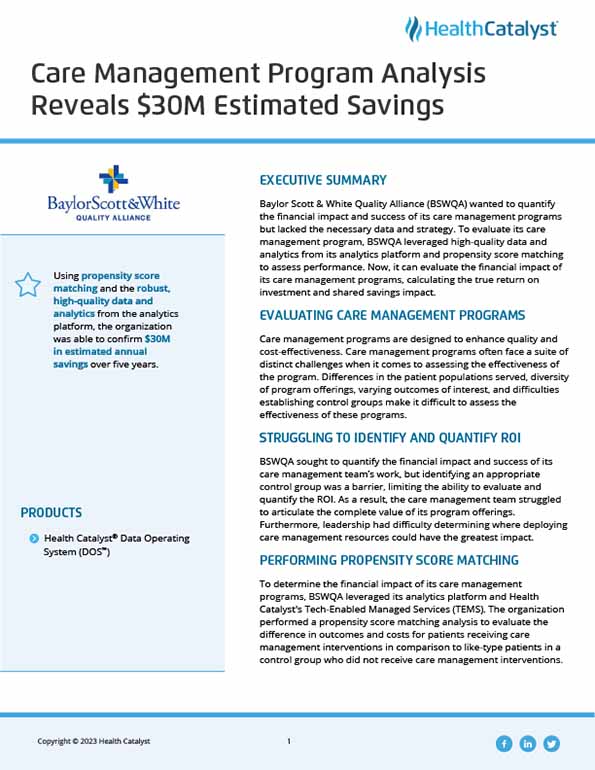Baylor Scott & White Quality Alliance (BSWQA) wanted to quantify the financial impact and success of its care management programs but lacked the necessary data and strategy. To evaluate its care management program, BSWQA leveraged high-quality data and analytics from its analytics platform and propensity score matching to assess performance. Now, it can evaluate the financial impact of its care management programs, calculating the true return on investment and shared savings impact.
Care management programs are designed to enhance quality and cost-effectiveness. Care management programs often face a suite of distinct challenges when it comes to assessing the effectiveness of the program. Differences in the patient populations served, diversity of program offerings, varying outcomes of interest, and difficulties establishing control groups make it difficult to assess the effectiveness of these programs.
Baylor Scott & White Quality Alliance (BSWQA) is the accountable care organization (ACO) affiliated with Baylor Scott & White Health. It is comprised of more than 6,000 primary and specialty care physician members, 50 hospitals, 95+ post-acute care facilities, and other healthcare stakeholders, all agreeing to be jointly accountable for improving quality, enhancing the patient experience, and reducing healthcare costs. BSWQA currently manages over 700,000 covered lives across commercial, Medicare, Medicaid, ACA exchange, and direct-to-employer lines of business.
BSWQA sought to quantify the financial impact and success of its care management team’s work, but identifying an appropriate control group was a barrier, limiting the ability to evaluate and quantify the ROI. As a result, the care management team struggled to articulate the complete value of its program offerings. Furthermore, leadership had difficulty determining where deploying care management resources could have the greatest impact.
To determine the financial impact of its care management programs, BSWQA leveraged its analytics platform and Health Catalyst's Tech-Enabled Managed Services (TEMS). The organization performed a propensity score matching analysis to evaluate the difference in outcomes and costs for patients receiving care management interventions in comparison to like-type patients in a control group who did not receive care management interventions.
Propensity score matching involves a trade-off among balance, generalizability, sample size, external validity, and precision. One of the most important decisions BSWQA made was to ensure proper variables were used in the model. The team engaged data engineers, data analysts, data scientists, financial analysts, and industry professionals, all of whom have detailed understanding of the care management programs and patient characteristics and needs, to collaborate in the initiative and select the variables used. Choosing the right variables helped them find results that accurately identified areas of success and failure.
BSWQA uses the robust high-value data from its analytics platform, including patient characteristic data as well as quality and utilization measures, to evaluate the effectiveness of its care management programs. The organization uses basic demographics like gender and age, utilization data, and diagnosis/disease cohort data. Using propensity score matching, the organization can identify appropriate control groups for comparison.
Using the analytics platform, BSWQA analyzes and identifies differences in outcomes and costs for more than 700,000 lives across a dozen different payers. The organization can now visualize the results of the care management analysis to gain easy access to new insights. Leaders use the analyses to evaluate the effectiveness of the various care management programs and patient outreach activities.
Leaders can visualize different care management use cases and evaluation and drill into the data to determine the expected savings for each successful patient outreach by outreach type and the reason for the outreach. For example, a leader can use the analytics application to answer a question like, “For patients with cardiovascular disease and Medicare insurance who are being discharged from the hospital, how much does transition support from a care manager within three days of discharge help decrease costs?” This knowledge allows the organization to identify where it can expect to see the most success and determine which programs may need to be adjusted or addressed for continuous improvement.
The organization also uses the data to establish improvement goals for specific contracts, regions, and patient populations, informing the development of the service models required for improvement.
"The robust data in our analytics platform enabled us to use propensity score matching to create appropriate cohorts and evaluate the effectiveness of our care management programs. Leaders now have greater insight into the ROI and can make informed resource allocation decisions to improve patient outcomes and organizational performance."
- Adam Geller, Analytics Developer, Baylor Scott & White Quality Alliance
For the first time, BSWQA can evaluate the financial impact of its care management programs, calculating the true ROI and shared savings impact. Using propensity score matching and the robust data from its analytics platform, the organization was able to confirm:
BSWQA will expand the use of propensity score matching to additional use cases, providing the organization the insight required to effectively evaluate complex programs and make informed decisions regarding resource allocation.


